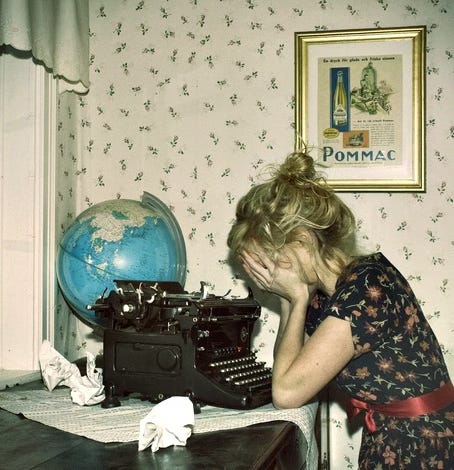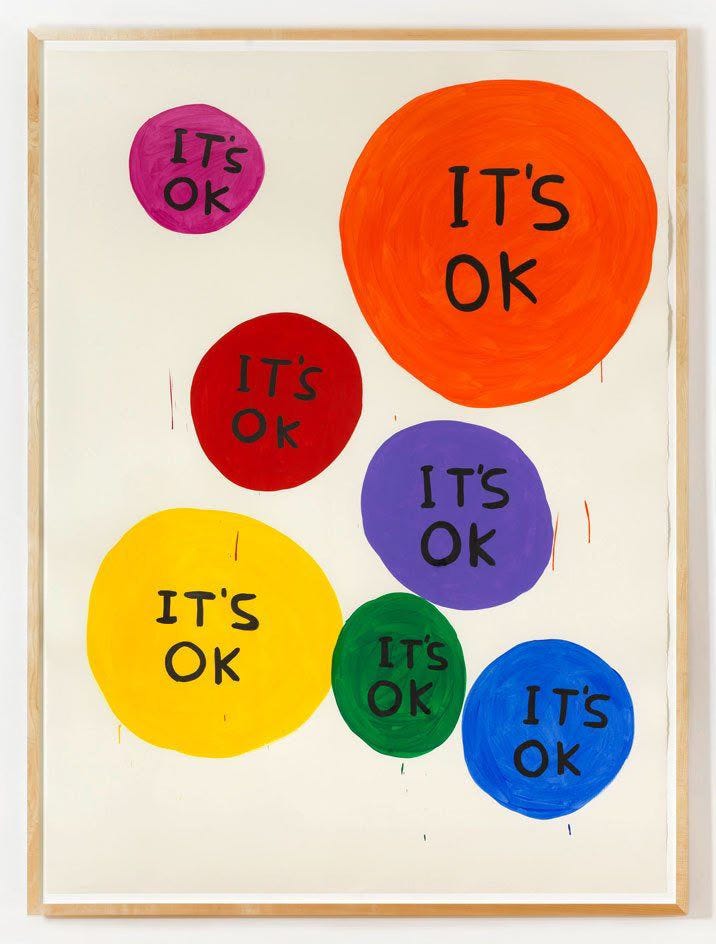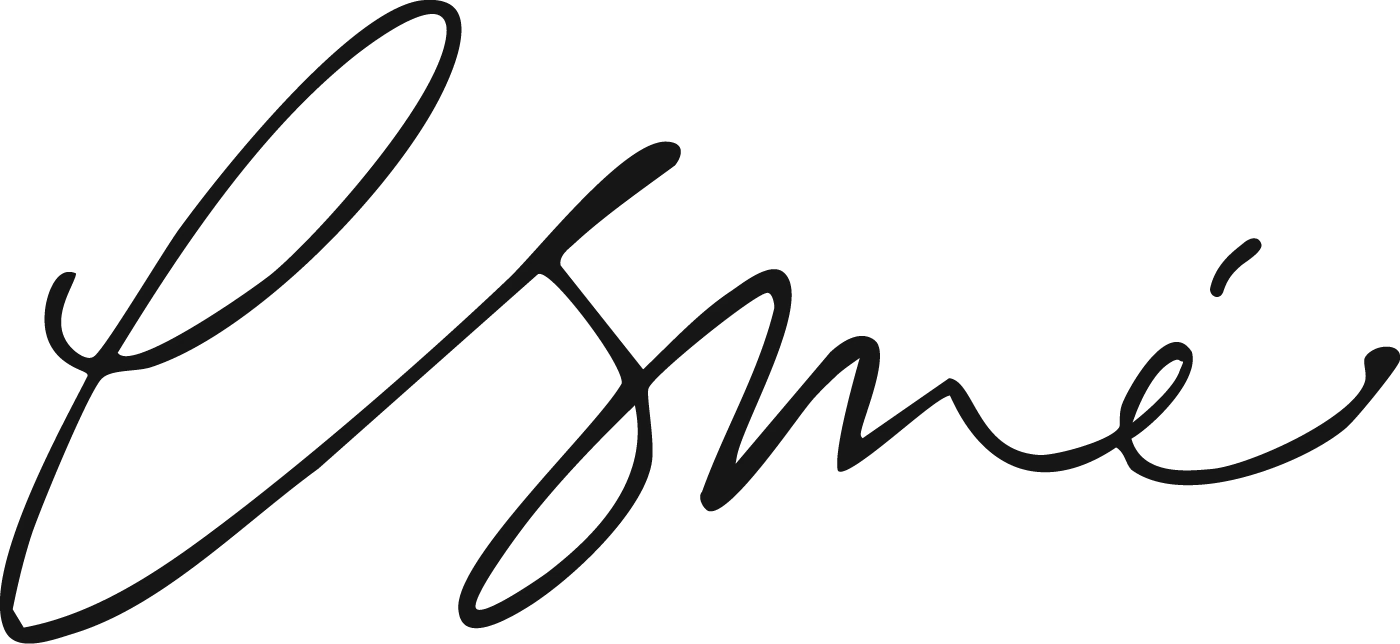Reason for Living #13: Writing
after months of being unable to write, the writing finally came
I sent the text to my best friend at 3:44 PM:
"dammit it seems like C has deep vein thrombosis again and I am too exhausted to go with him to the ER so our neighbor is taking him."
My husband's leg looked like it belonged to someone else. I knew that look—the dangerous puffiness that signals DVT, the kind of mega-clotting of the blood that can break loose, travel to your lungs, and kill you. We'd been down this road before when he was in the hospital. All I’d known about deep vein thrombosis back then was that it was probably what killed Logan Roy on his private jet.
When he came into my room with one leg twice the size of the other, I straightaway wanted to call 911. I was worried that C wasn’t going to get medical treatment in time if we took a Lyft, and he certainly wasn’t in any shape to drive. I don’t have a license, having stopped driving in 2003 because my disabilities make it too risky for me to be behind the wheel. Our neighbor kindly drove him instead. And me? I stayed home: so exhausted that everything felt impossible, so depleted that I couldn't be the supportive wife rushing to the emergency room with a bag of his medications and a phone charger. Feeling angry at myself for failing and stuffing myself with stimulants so that I could hopefully come to the hospital if I needed to.
The guilt felt familiar. It’s the same weight I carry when I can't write. The words remain letters that won’t coalesce, unlike the “sticky” blood that’s forming the enormous clots occluding C’s veins. When I can’t write, I feel like I'm failing at one of the things I can actually do well.
I tell my students at The Unexpected Shape Writing Academy to keep one hand on the manuscript every day. Not writing every day—that impossible standard that makes so many of us feel inadequate. Just touching. Reading one sentence aloud. Typing one word to improve a paragraph. Keeping that relationship alive between yourself and the work, even if the work is being stubborn or you have a migraine or there’s simply not enough time. I like it because it’s a concept that rewards instead of punishes. My students feel accomplished when they manage even the smallest connection. It acknowledges what those of us writing with limitations already know: on some days, touching the page is already a victory.
I've been trying to follow my own advice, which is always easier said than done. Since my own ER visit a few months ago—the burst ovarian cyst I wrote about in my last newsletter—I've felt profoundly, agonizingly stuck. I thought it was run-of-the-mill writer's block. Now I recognize it differently: trauma to the body creates brain fog as much as any psychological barrier.
For weeks, I tried to touch the page. The page refused, aloof and unaware of just how much I needed it to cooperate.
More recently, though, something shifted. I synced back into the work. I finished a chapter a few days ago, and the happiness of doing it was so sweetly pure that I couldn't believe how much I'd missed it. The act of writing is one of my reasons for living. Putting words on the page is one of my reasons for being a person in this world.
Writing, after all, is a slit in the fabric of reality. It’s a place I can slip through and find myself anywhere: a chalet-like hotel, world-class and haunted. An Oscar nominee named Anjali wakes frozen with sleep paralysis while a ghoul approaches wearing her girlfriend's face. I make up whatever I want. I make the words say what I need them to say, shifting them around like puzzle pieces to put them in the correct order. It's a phenomenal feeling, particularly in a world where so very little is under our control. We are at war with Iran. Ukraine is still being bombed with regularity by Russia. Gaza is devastated; Sudan, wrecked. None of it makes sense; I’m only not there because I was born here, and donate to Doctors Without Borders and buy eSIMS.
I check my phone.
"Doctor just came by there’s definitely some blood clots. They’re just checking with hematology to make sure of the right blood thinner to give me. They will also do CAT scans of my lungs and abdomen to see if there’s any clot in my lungs which would be the big concern and while we’re doing it to see if there’s a kidney stone."
"Are you scared?" I texted.
"No."
"Are you scared?" he asked back.
"No. I think you'll be okay."
So many medical catastrophes have happened between us that it becomes impossible to panic all the time. I think about all the days I've spent in hospital rooms and doctor's offices, all the times I've had IVs in my arms and all the times C has had IVs in his. How deeply we love each other. How in sickness and in health means something specific when you're constantly thinking about health—yours and your partner's.
I pull a Tarot card: it’s The Magician. The alchemist, the maker.
My friend Suleika Jaouad said something that I absolutely love: “Sometimes the only way to endure suffering is to transform it into art.”
In the middle of a life where medical emergencies punctuate seemingly ordinary Saturdays, I write. I can build realities where I have control, where the words bend to my will instead of my body or C’s body frustratingly warping in ways we didn't choose.
In a few weeks, I'll be heading to a writing residency—my first since before C got sick. I'm incredibly eager to be somewhere solely for the purpose of writing, to spend time living to finish my book. At least that's what I tell myself.
I'm so lucky to be able to write—to create worlds—to make language mean something when meaning often seems pathetically rare. I'm so lucky that my husband has medical care and that he loves me and that yesterday we went to karaoke and I sang a Steven Universe song that I'd recorded myself plaintively singing on a voice memo in 2018, drunk on martinis and joy.
“OK no evidence of a heart attack and no acute heart injury,” I texted after looking at his test results. “Very good news.”
“Yay heart”
And sometimes, writing means keeping one hand on the page even when your other hand is packing a hospital bag, even when your body says no no no, even when the page refuses you back because the relationship between writer and work is like any relationship. The work wants tending, forgiveness, and the faith that connection is possible even when it feels severed after a terrible fight. Especially then.
I tell myself: Your manuscript will wait for you. Your story will wait for you. And when you're ready—when your body lets you, when the fog clears enough—you can slip through that slit in reality again and remember why writing is worth the doing. ❤️
What's your smallest way of touching the page today? Share in the comments below.
Ready to build a sustainable writing practice that honors your limitations? Learn more about The Unexpected Shape Writing Academy and how to keep one hand on your manuscript through life's inevitable interruptions.
If this resonated with you, join our free community, The Unexpected Shape Café, for more honest conversations about writing with chronic illness and life's beautiful complications.

Your memoir doesn't have to wait for a "clear head" day.
If you've ever sat down to write your story only to feel like your thoughts are swimming through molasses, you're not alone. Brain fog—whether from chronic illness, medication, stress, or life's overwhelming demands—doesn't mean your voice doesn't matter.
On July 12th, I'm teaching Writing Through Brain Fog: Cognitive Strategies for Memoir, and I genuinely believe this will be the most practical, life-changing class I've offered this year.
This isn't about "powering through" or waiting for better days. It's about working with your brain exactly as it is right now—and still creating meaningful work that honors your story.
What you'll get:
Concrete techniques that work when concentration feels impossible
A beautiful workbook designed for easy re-entry during difficult periods
Full recording so you can revisit strategies whenever you need them
Resources specifically calibrated for fluctuating cognitive capacity
I've written a New York Times bestseller largely from my bed, using my iPhone, while navigating serious cognitive challenges. These aren't theoretical strategies—they're tested methods that transform limitation into creative possibility.
The truth? I already see the transformation coming for the writers who join us. Your story deserves to exist in the world, and brain fog doesn't get to be the thing that stops it.
Join Writing Through Brain Fog here.
Your memoir is waiting. Let's find a way to reach it.
P.S. Some people have asked if this class would be useful for people writing things other than memoirs. I believe the answer is yes—it’s primarily about writing, regardless of what it is that you’re writing down.
Zarxio: Injection
Most of what I feel is my imagination.
Marrow thin as a minnow, tired as winter.
The wild blue of neutrophils
dwindling like a stand of harebell
in a frosted-over field. My veins are ferrous
and inhospitable. A motley coagulation of cells
refuses to carry oxygen up these hills.
Nosebleeds, nightly, bead on my upper lip
like a line of rubies. I imagine me magnificent, bejeweled.
The needle itself is nothing—thin, refrigerated.
The nurse presses a bandage to the wound, barely there.
I blush like a debutante—rose on the cheek, the chest,
the left breast that looks like worry. But mostly,
it’s bone ache that comes. The body I’m afraid to be
alone with. The naïve bone that makes itself better
so it can be broken down. Ribs turn violet,
violent, a heat that holds me. The sacrum beats
its elegant white heart through the night.
Right distal radius, right tibia—old hurts return, sharpen.
How does one body remember so much?
When the world feels like too much, we need reminders of why we stay.
I know what it's like to search for those crucial, critical reasons to keep going. As someone who lives with schizoaffective disorder, fibromyalgia, and C-PTSD, among a bevy of other wonders, I navigate the tender landscape between safety and danger daily, I've learned that meaning isn't found in One Big Saving Grace. It's cultivated in small, true things worth staying for.
That's why I created REASONS FOR LIVING with Esmé Weijun Wang—a sanctuary for people who feel deeply in a world that often overwhelms.
This is for you if:
You're sensitive (really darn sensitive) and need reminders that this is strength, not liability
The weight of the world feels heavy, but you're still working to make it better
Traditional "self-help" makes you roll your eyes or feel broken
You crave genuine depth and connection with others who understand
What you'll find: Every month, thoughtful essays exploring what makes life worth living (even when it's hard), carefully curated reasons from art and literature, and reflection prompts for your own meaning-making practice.
Paid members ($7/month, $70/year) also receive: Two intimate personal essays too tender for public consumption, access to the secret Vault of resources worth $400+, meaningful comment threads with fellow seekers, and seasonal care packages that drop into your inbox like gentle reminders.
As one member wrote: "Esmé's newsletter is filled with a gentleness that I don't normally find... I will never unsubscribe."
For less than a coffee date, you're joining nearly 300 people who've decided their inner life is worth tending to. You're choosing connection over isolation. You're saying yes to regular reminders of beauty when the world feels ugly.
When sensitivity feels like too much, we'll remind you it's actually a different kind of strength.









Twelve years ago I got a confusing call from my stepfather saying that my mom had had leg pain and then she’d coded during triage in the ER and now she was in the ICU and might not make it. She survived that particular catastrophe (a pulmonary embolism caused by a DVT), but her cancer wasn’t diagnosed until several years later. When I read your post about C I absolutely panicked inside and was also so moved by the bravery it took for you to admit that you just couldn’t go to the ER with him (yet). There’s so much vulnerability and beauty and wisdom in this post, too, and it makes me want to work harder to keep a hand on my own writing. Thank you, Esme.
Thank you for inviting us to bear witness as you find your way both to and through the words. Your experiences resonate deeply with me, as every moment of medical trauma feels like it widens the gulf between me and what I want to say. And somehow, we forge a path across anyway. Wishing you and C ease as you navigate.